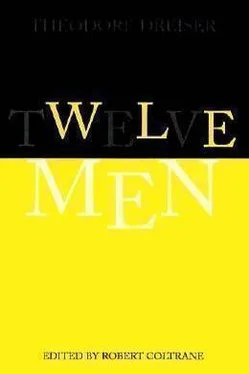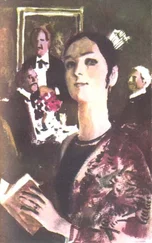Теодор Драйзер - Twelve Men
Здесь есть возможность читать онлайн «Теодор Драйзер - Twelve Men» весь текст электронной книги совершенно бесплатно (целиком полную версию без сокращений). В некоторых случаях можно слушать аудио, скачать через торрент в формате fb2 и присутствует краткое содержание. Год выпуска: 2014, Издательство: epubBooks Classics, Жанр: Биографии и Мемуары, на английском языке. Описание произведения, (предисловие) а так же отзывы посетителей доступны на портале библиотеки ЛибКат.
- Название:Twelve Men
- Автор:
- Издательство:epubBooks Classics
- Жанр:
- Год:2014
- ISBN:нет данных
- Рейтинг книги:4 / 5. Голосов: 1
-
Избранное:Добавить в избранное
- Отзывы:
-
Ваша оценка:
- 80
- 1
- 2
- 3
- 4
- 5
Twelve Men: краткое содержание, описание и аннотация
Предлагаем к чтению аннотацию, описание, краткое содержание или предисловие (зависит от того, что написал сам автор книги «Twelve Men»). Если вы не нашли необходимую информацию о книге — напишите в комментариях, мы постараемся отыскать её.
Twelve Men — читать онлайн бесплатно полную книгу (весь текст) целиком
Ниже представлен текст книги, разбитый по страницам. Система сохранения места последней прочитанной страницы, позволяет с удобством читать онлайн бесплатно книгу «Twelve Men», без необходимости каждый раз заново искать на чём Вы остановились. Поставьте закладку, и сможете в любой момент перейти на страницу, на которой закончили чтение.
Интервал:
Закладка:
No one responded, although there was much discussion in a low key. Some could, or thought they could, but hesitated to assume so frightful a risk. At the same time Culhane, hearing the fuss and knowing perhaps that his substitute could not trumpet, turned grimly around and said, "Say, do you mean to say there isn't any one back there who knows how to blow that thing? What's the matter with you, Caswell?" he called to one, and getting only mumbled explanations from that quarter, called to another, "How about you, Drewberry? Or you, Crashaw?"
All three apologized briskly. They were terrified by the mere thought of trying. Indeed no one seemed eager to assume the responsibility, until finally he became so threatening and assured us so volubly that unless some immediate and cheerful response were made he would never again waste one blank minute on a lot of blank–blank this and thats, that one youth, a rash young society somebody from Rochester, volunteered more or less feebly that he "thought" that "maybe he could manage it." He took a seat directly under the pompously placed trumpeter, and we were off.
"Heigh–ho!" Out the gate and down the road and up a nearby slope at a smart clip, all of us gazing cheerfully and possibly vainly about, for it was a bright day and a gay country. Now the trumpeter, as is provided for on all such occasions, lifted the trumpet to his lips and began on the grandiose "ta–ra–ta–ta," but to our grief and pain, although he got through fairly successfully on his first attempt, there was one place where there was a slight hitch, a "false crack," as some one rowdyishly remarked. Culhane, although tucking up his lines and stiffening his back irritably at this flaw, said nothing. For after all a poor trumpeter was better than none at all. A little later, however, the trumpeter having hesitated to begin again, he called back, "Well, what about the horn? What about the horn? Can't you do something with it? Have you quit for the day?"
Up went the horn once more, and a most noble and encouraging "Ta–ra–ta–ta" was begun, but just at the critical point, and when we were all most prayerfully hoping against hope, as it were, that this time he would round the dangerous curves of it gracefully and come to a grand finish, there was a most disconcerting and disheartening squeak. It was pathetic, ghastly. As one man we wilted. What would Culhane say to that? We were not long in doubt. "Great Christ!" he shouted, looking back and showing a countenance so black that it was positively terrifying. "Who did that? Throw him off! What do you think—that I want the whole country to know I'm airing a lot of lunatics? Somebody who can blow that thing, take it and blow it, for God's sake! I'm not going to drive around here without a trumpeter!"
For a few moments there was more or less painful gabbling in all the rows, pathetic whisperings and "go ons" or eager urgings of one and another to sacrifice himself upon the altar of necessity, insistences by the ex–trumpeter that he had blown trumpets in his day as good as any one—what the deuce had got into him anyhow? It must be the horn!
"Well," shouted Culhane finally, as a stop–gap to all this, "isn't any one going to blow that thing? Do you mean to tell me that I'm hauling all of you around, with not a man among you able to blow a dinky little horn? What's the use of my keeping a lot of fancy vehicles in my barn when all I have to deal with is a lot of shoe salesmen and floorwalkers? Hell! Any child can blow it. It's as easy as a fish–horn. If I hadn't these horses to attend to I'd blow it myself. Come on—come on! Kerrigan, what's the matter with you blowing it?"
"The truth is, Mr. Culhane," explained Mr. Kerrigan, the very dapper and polite heir of a Philadelphia starch millionaire, "I haven't had any chance to practice with one of those for several years. I'll try it if you want me to, but I can't guarantee—"
"Try!" insisted Culhane violently. "You can't do any worse than that other mutt, if you blow for a million years. Blow it! Blow it!"
Mr. Kerrigan turned back and being very cheerfully tendered the horn by the last failure, wetted and adjusted his lips, lifted it upward and backward—and—
It was pathetic. It was positively dreadful, the wheezing, grinding sounds that were emitted.
"God!" shouted Culhane, pulling up the coach to a dead stop. "Stop that! Whoa! Whoa!!! Do you mean to say that that's the best you can do? Well, this finishes me! Whoa! What kind of a bunch of cattle have I got up here, anyhow? Whoa! And out in this country too where I'm known and where they know all about such things! God! Whoa! Here I spend thousands of dollars to get together an equipment that will make a pleasant afternoon for a crowd of gentlemen, and this is what I draw—hams! A lot of barflies who never saw a tally–ho! Well, I'm done! I'm through! I'll split the damned thing up for firewood before I ever take it out again! Get down! Get out, all of you! I'll not haul one of you back a step! Walk back or anywhere you please—to hell, for all I care! I'm through! Get out! I'm going to turn around and get back to the barn as quick as I can—up some alley if I can find one. To think of having such a bunch of hacks to deal with!"
Humbly and wearily we climbed down and, while he drove savagely on to some turning–place, stood about first in small groups, then by twos and threes began making our way—rather gingerly, I must confess, in our fine clothes—along the winding road back to the place on the hill. But such swearing! Such un–Sabbath–like comments! The number of times his sturdy Irish soul was wished into innermost and almost sacrosanct portions of Sheol! He was cursed from more angles and in more artistically and architecturally nobly constructed phrases and even paragraphs than any human being that I have ever heard of before or since, phrases so livid and glistening that they smoked.
Talk about the carved ivories of speech! The mosaics of verbal precious stones!
You should have heard us on our way back!
And still we stayed.
Some two years later I was passing this place in company with some friends, when I asked my host, who also knew of the place, to turn in. During my stay it had been the privilege and custom among those who knew much of this institution to drive through the grounds and past the very doors of the "repair shop," even to stop if Culhane chanced to be visible and talking to or at least greeting him, in some cases. A custom of Culhane's was, in the summer time, to have erected on the lawn a large green–and–white striped marquee tent, a very handsome thing indeed, in which was placed a field–officer's table and several camp chairs, and some books and papers. Here of a hot day, when he was not busy with us, he would sit and read. And when he was in here or somewhere about, a little pennant was run up, possibly as guide to visiting guests or friends. At any rate, it was the presence of this pennant which caused me to know that he was about and to wish that I might have a look at him once more, great lion that he was. As "guests," none of us were ever allowed to come within more than ten feet of it, let alone in it. As passing visitors, however, we might, and many did, stop, remind him that we had once been his humble slaves, and ask leave to congratulate him on his health and sturdy years. At such times, if the visitors looked interesting enough, or he remembered them well, he would deign to come to the tent–fly and, standing there à la Napoleon at Lodi or Grant in the Wilderness, be for the first time in his relations with them a bit civil.
Anyway, on this occasion, urged on by curiosity to see my liege once more and also to learn whether he would remember me at all, I had my present host roll his car up to the tent door, where Culhane was reading. Feeling that by this venturesome deed I had "let myself in for it" and had to "make a showing," I climbed briskly out and, approaching, recalled myself to him. With a semi–wry expression, half smile, half contemptuous curl of the corners of his mouth, he recalled me and took my extended hand; then seeing that possibly my friends if not myself looked interesting, he arose and came to the door. I introduced them—one a naval officer of distinction, the other the owner of a great estate some miles farther on. For the first time in my relations with him I had an opportunity to note how grandly gracious he could be. He accepted my friends' congratulations as to the view with a princely nod and suggested that on other days it was even better. He was soon to be busy now or he would have some one show my friends through the shop. Some Saturday afternoon, if they would telephone or stop in passing, he would oblige.
Читать дальшеИнтервал:
Закладка:
Похожие книги на «Twelve Men»
Представляем Вашему вниманию похожие книги на «Twelve Men» списком для выбора. Мы отобрали схожую по названию и смыслу литературу в надежде предоставить читателям больше вариантов отыскать новые, интересные, ещё непрочитанные произведения.
Обсуждение, отзывы о книге «Twelve Men» и просто собственные мнения читателей. Оставьте ваши комментарии, напишите, что Вы думаете о произведении, его смысле или главных героях. Укажите что конкретно понравилось, а что нет, и почему Вы так считаете.









